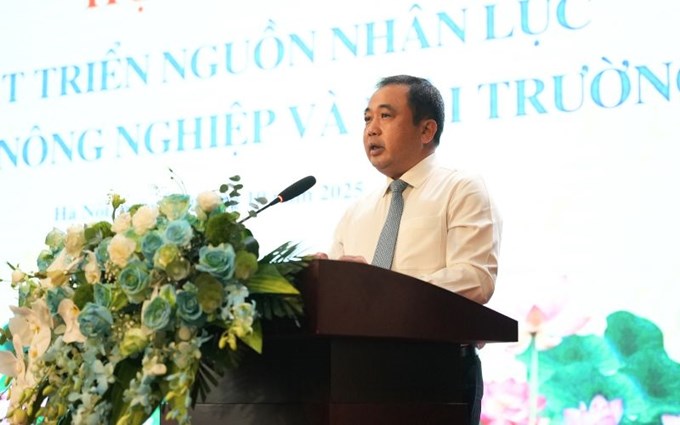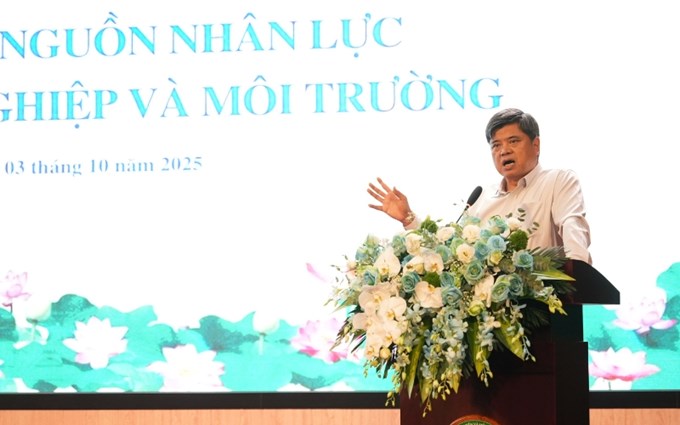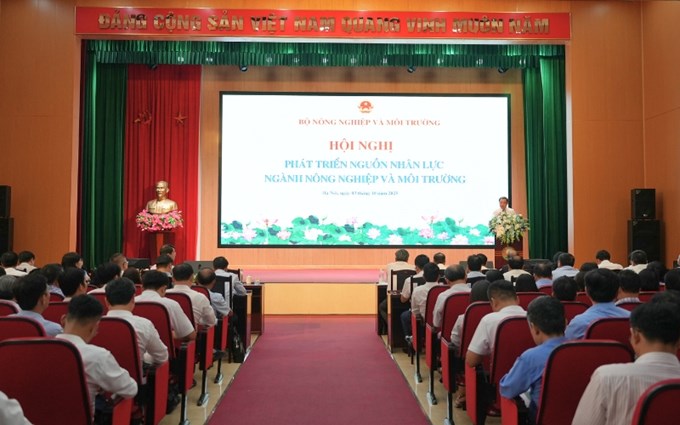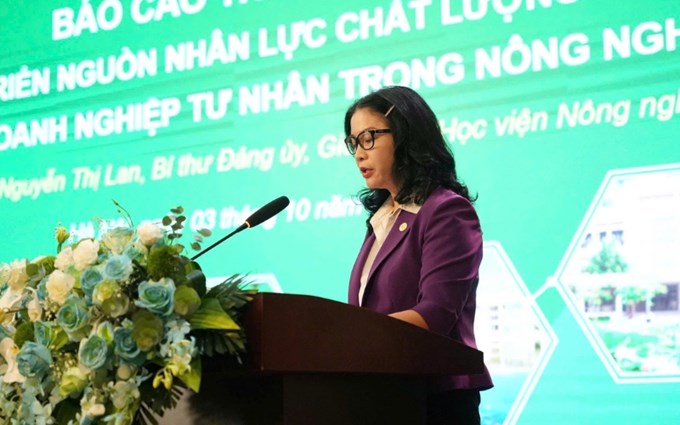On October 3, 2025, the Party Committee of the Ministry of Agriculture and Environment held a conference entitled “Developing Human Resources for Agriculture and Environment: Intelligence – Quality – Integration.” The event served as an important forum for management agencies, educational institutions, and experts to exchange views and align their understanding and actions on the crucial role of human resources in implementing the strategy for modern, sustainable agricultural development, contributing to the successful realization of the national human resource development goals.
The Ministry of Agriculture and Environment Commits to Investing in Human Resource Development
Speaking at the conference, Mr. Tran Duc Thang, Acting Minister of Agriculture and Environment, emphasized that, “The Ministry of Agriculture and Environment is among the ministries with the largest number of universities and research institutes, 32 prestigious training institutions contributing to the country’s development. Our lectureres and researchers have been increasingly standardized, with the proportion of postgraduate lecturers higher than the national average. The Ministry currently employs more than 25,000 employees, including about 6,000 scientific researchers directly engaged in research, technology transfer, training, and human resource development for the sector.”

Acting Minister of Agriculture and Environment highly appreciates the meaning of the conference.
According to Acting Minister Tran Duc Thang, to implement Resolution No. 71 of the Politburo and the Human Resource Development Strategy for the Agriculture and Environment Sector to 2030, with a Vision to 2045, the Ministry was urgently developing concrete action plans. In the new context, rapid and sustainable national development required a workforce that met the demands of the integration era. The Ministry was committed to strengthening investment in research and training infrastructure, while also promoting mechanisms and policies on income, training, and research support for staff and lecturers within its management scope.
In the context of the country entering a new stage of development, the First Party Congress of the Ministry of Agriculture and Environment identified four strategic breakthroughs for the upcoming period as follows: (i) institutional reform; (ii) science, technology, and digital transformation; (iii) development of modern, multi-purpose infrastructure; and (iv) human resource development. In recent years, the Party Committee and the Ministry of Agriculture and Environment had paid special attention to leading, directing, and implementing the Party and State’s policies on education, training, and human resource development. As a result, the sector had gradually built a workforce capable of meeting both the quantitative and qualitative requirements for agricultural and rural development, thereby contributing to the successful fulfillment of the sector’s political mission.
At the conference, Deputy Minister Tran Thanh Nam emphasized the need to clearly define key concepts such as human resources, high-quality human resources, and high-level human resources to set appropriate priorities in planning. He also underscored the implementation spirit of Resolution 71, proposing a training order mechanism and the elevation of six universities under the Ministry into national innovation centers wit the aim of linking research, education, and production practice.

Deputy Minister Tran Thanh Nam emphasizes the principles and spirit of Resolution No. 71.
Training Human Resources for Integration
Assessing the current status of human resource training, Mr. Pham Tan Tuyen, Director of the Department of Personnel and Organization, stated that the Ministry’s universities and vocational institutions had established a widespread network across many economic regions. The Ministry had invested in building eight high-quality universities that met regional and international standards. They actively collaborated with localities in career orientation and enrollment, and had signed agreements with major domestic and international enterprises to provide internships, job commitments, scholarships, and paid training programs for students.
These achievements had significantly contributed to increasing the proportion of trained workers and improving human resource quality, thereby facilitating crop and livestock restructuring, technological application, and value addition—accelerating industrialization, modernization, and the transformation of rural economic structures. This had laid the foundation for Vietnam’s growing position among the world’s leading agricultural exporters.

Overview of the conference
However, human resource development still faced numerous challenges. Infrastructure of some units remained inadequate for training high-quality human resources and conducting research. The managers, especially at the local level, lacked professionalism. The brain drain phenomenon persisted, with many senior scientists leaving the public sector. Furthermore, university enrollment in geology, agriculture, and forestry had been declining, posing a challenge to maintaining and enhancing human resource quality in agriculture and environmental sectors.
Solutions for Promoting Human Resource Development
The conference recorded many recommendations from experts and delegates to realize the goal of developing high-quality human resources, thereby enhancing global competitiveness and sustainable development.
Mr. Bui Ton Hien, Deputy Director of the Institute of State Organizational Sciences and Labor (Ministry of Home Affairs), suggested that reports should be more detailed and comprehensive, highlighting achievements in food security and poverty reduction. He also emphasized the need for a clear categorization of human resources to improve the effectiveness of training, transfer, and research efforts.
To develop a high-quality workforce serving the private agricultural sector, Dr. Nguyen Thị Lan, President of Vietnam National University of Agriculture (VNUA), proposed that educational institutions should modernize their curricula in alignment with international standards, focusing on digital skills, foreign languages, and ESG (Environmental, Social, and Governance) competencies. She also emphasized the importance of dual education programs, entrepreneurship and spin-off initiatives, and the implementation of Industrial PhD models tailored to business needs. For private enterprises, she emphasized the importance of taking an active role in training orders, internships, R&D investment, and cooperation with universities, as well as contributions to scholarship funds and international programs to support the next generation of skilled workers.

Prof. Nguyen Thi Lan, President of Vietnam National University of Agriculture (VNUA)
Dr. Dang Thi Lua, Director of the Research Institute for Aquaculture No. I, emphasized that to ensure sufficient quantity and quality of human resources for the fisheries sector in the coming period, it was essential to increase funding for scientific and technological research, support long-term research programs, and create conducive conditions for scientists to conduct research and development activities, and apply technology in practice.
The conference played a vital role in promoting strong, coordinated, and strategic actions to develop the sector’s human resources, not only to address immediate shortages but also to build a long-term foundation for agricultural restructuring linked to green growth, environmental security, and sustainable development, thereby enhancing the sector’s competitiveness in the global value chain.